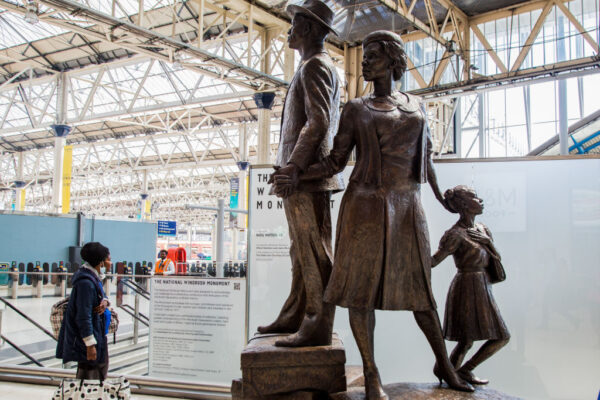Many in Britain’s Afro-Caribbean diaspora have rebuffed the government’s ceremonious honor for Caribbean immigrants exhibited through a statue unveiled this week.
Prince William and government officials revealed the National Windrush Monument on Wednesday in tribute to the hundreds of thousands of Caribbean nationals that left their homes to help rebuild the United Kingdom’s labor force after World War II.
The sculpture by Jamaican artist Basil Watson shows a man, woman and young girl standing on suitcases in their Sunday best. It was erected at one of London’s biggest train stations, reports show.

The family represents the 500,000 Caribbean immigrants who entered the U.K. between 1948 and 1971, dubbed the Windrush Generation, named after the ship Empire Windrush that transported the initial migrant population in 1948.
Queen Elizabeth II, in a statement, said the monument unveiled on Windrush Day “was a fitting thank you to” the Windrush families and their descendants, “in recognition of the profound contribution they have made.”
However, members of the advocacy group Windrush Lives said the symbolic gesture ignores the injustice that transpired after the Caribbean immigrants were no longer needed to fill labor gaps.
In 2012, the British government announced a policy that led to the deportation of some and threatened the immigration status of thousands of Caribbean immigrants who were invited to come without documentation.
“We will not get to the root of the disease without a wholesale reckoning in public,” representatives for Windrush Lives said in a tweet. The group also serves as a support group for Windrush victims.
The Hostile Environment Policy required immigrants to show proof that they had the right to stay in the U.K. permanently, conflicting with the considerations promised with the Windrush migration.
Reports show that up to 57,000 people from Commonwealth countries, mostly in the Caribbean, were impacted by the policy. About 15,000 of the immigrants were from Jamaica. In addition, a number of people impacted were from Kenya and Sierra Leone.
Many of them lost their jobs, homes and the ability to leave and re-enter the country. Most of them are elderly, who arrived with their parents and were not required to have passports or other identification.
The adverse effects of the Hostile Environment Policy on the Windrush Generation came to light in 2018. It was condemned by the United Nations Human Rights Council and U.K.’s Equality Human Rights Commission for being “inhumane.” The nation’s immigration agency apologized for its wrongdoing and its leader stepped down.
The government announced a plan to compensate victims in December 2018, but reports show that only 5 percent were compensated by 2021. Recent numbers show about 15 percent have been paid. Some eligible victims died before they could receive payments.
Victim Glenda Caesar came to the U.K. as a baby, lost her right to work since 2009 and has faced deportation.
“We have got people out in the community who are still waiting to get payments and it’s very difficult with the helpline,” she said. “Us as a community and grassroots organizations have given them [Home Office] so many ideas for them to improve the system, but it doesn’t seem to be working.”
Windrush Lives pointed out that the average payout Windrush compensation claim so far has been about £94,000 ($115,200), or less than 10 percent of the £1 million ($1.2 million) the government paid for the statue. Just a few cases are more than £40,000 to £50,000, or $49,000 to $61,300, the organization added.
The organization is demanding that the compensation plan be “stripped” from the immigration agency and handled independently.
“It is a systemic injustice, perpetrated against people without the resources to engage in multi-year attritional battles with one of the most powerful and unaccountable arms of state,” Windrush Lives said.
“Make the [Windrush Compensation Scheme] independent, and announce a statutory inquiry into the causes of the Windrush Scandal, the ongoing trauma it has given rise to and the Hostile Environment. Until that’s done, stuff your statues and memorials.”
Jacqueline McKenzie, a partner at Leigh Day, an immigration law firm that represents more than 300 people impacted by the policy, said she skipped the ceremony “whilst justice is being denied to thousands of victims.”
“We say the scandal is not abated because so few people are obtaining redress,” McKenzie said. “Less than 1,000 people have had an offer of compensation, and we know from our work that many of these are refusing their offers.”
During Wednesday’s ceremony, Prince William acknowledged the scandal “profoundly wronged” Afro-Caribbean immigrants. He also remarked on the discrimination the immigrants and their descendants continue to face.
“Discrimination remains an all too familiar experience for Black men and women in Britain in 2022,” he said.
“Alongside celebrating the diverse fabric of our families, our communities and our society as a whole — something the Windrush generation has contributed so much to — it is also important to acknowledge the ways in which the future they sought and deserved has yet to come to pass,” William added.


